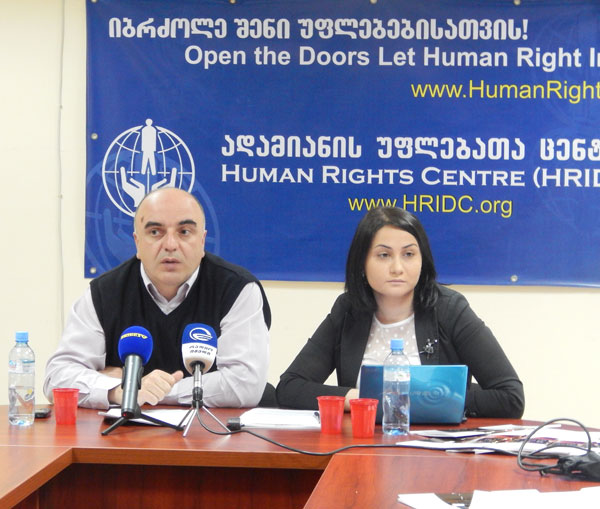Nino Devidze
On April 23, Human Rights Center presented report Georgian Media in Transitional Period. The Report was prepared with financial support of the National Endowment for Democracy (NED) and covers most significant developments in Georgian media in 2012-2014.
Electronic version of the report is available at humanrights.ge http://humanrights.ge/admin/editor/uploads/pdf/NED%20Media%20Report-eng.pdf
Elections and media, ethic and self-regulation, crisis in the Public Broadcasting, transition to digital broadcasting – it is incomplete list of the topics reflected in the Report. The author Salome Achba said, 2012-2013 were significant years for the development of Georgian media. “2012 Parliamentary Election was accompanied with aggressive pre-election campaign and of course it had impact on media coverage of the election process. As a result of active engagement of civil society, principles of Must Offer and Must carry went in force that significantly promoted awareness raising of the society and their access to different information sources. . The rule obliged cable operators to air all broadcasters throughout Georgia including local, regional broadcasters, who already broadcasted in their coverage zones and TV-channels, which were available for at least 20% of Georgian population. Unfortunately,Must Carry and Must Offer principle did not significantly improve situation because cable operators mostly operate in big cities of Georgia. Satellite dishes were the only source to get alternative information and dish antennas were the main sources for alternative information in the regions.”
Salome Achba said in comparison to 2012 Parliamentary Election 2013 Presidential Election Campaign was conducted in more peaceful environment, media was not polarized and election campaign was covered in more balanced and impartial manner. “Although media environment was less polarized during Presidential Elections, we observed insufficient number of analytic and in-depth TV programs. Except rear cases, journalists did not ask interesting, critical questions to the candidates and did not raise different interesting topics for discussion.”
There is special chapter on Transition to digital broadcasting in the HRC’s report. According to the agreement made with International Telecommunication Union (ITU) and European Union (EU) in 2006, Georgia became obliged to finish process of transition to digital broadcasting by June of 2015. Georgian TV channels are currently broadcasting through analog signal. This frequency is restricted and is not sufficient. That is why it was necessary to switch to digital broadcasting which gives possibility for sharing more channels as well as increasing quality of image and sound. When speaking about digital broadcasting, low awareness of the population about the issue is the main problem. “Though 8 years have passed since Georgia took on obligation to make transition to digital broadcasting, it did not have any legislative framework which would govern this process. The steps have been taken in this direction in 2014, when Georgian government adopted strategy for action and recommendations for transition to digital broadcasting. However, society does not have information about digital broadcasting, why we transmit to it and how it will apply to them. Financial readiness of the population is another issue. Part of population might have to purchase special devices to be able to receive and watch TV channels after TV becomes “digitalized” in 2015.”
The report also refers to recent crisis in the Public Broadcaster. “We have described all recent processes in the GPB. You know amendments were introduced to the law and new Board of Trustees was to be staffed. The process started but it was dragged out because Parliament of Georgia failed to approve all board members. The crisis was further increased by the judgment of the Constitutional Court, which restored authority of the old board members – so now we face obscure situation in the GPB. There is very complicated situation because GPB has old 7-member board and second new 9-member board, which still lacks two members.
Human Rights Center elaborated recommendations and enclosed them to the report: Provide comprehensive information to public regarding financial transparency of media organization and media ownership; Take faster and more effective steps in the process of transition to digital broadcasting; develop mechanisms to prevent monopolies in this sphere, inform society regarding digital broadcasting and more actively involve civil sector in this process;
Take effective steps to solve problems existing in Public Broadcaster – to complete formation of board in shortest terms to enable Public Broadcaster to function comprehensively; To enact more effective self-regulatory mechanisms in order to comply with standards of journalistic ethics; To make amendments in the Code of Conduct of Broadcasters which will clearly determine vague term of “interested individual”.
News
December 13, 2023
Ethnic minorities outside the peace dialogue
November 6, 2023
‘Peace’ agenda of political parties
Popular
Articles
February 13, 2024




